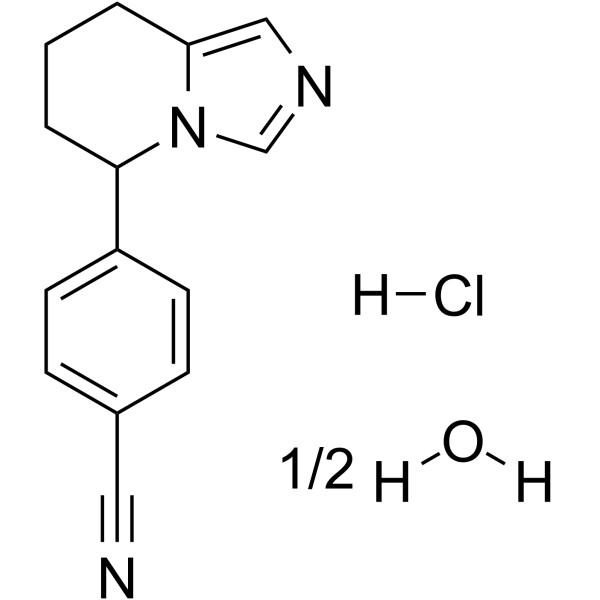176702-70-8
| Name | 4-(5,6,7,8-tetrahydroimidazo[1,5-a]pyridin-5-yl)benzonitrile,hydrate,dihydrochloride |
|---|---|
| Synonyms |
Fadrozole hydrochloride hydrate (JAN)
UNII-O5207G4XQ9 Afema (TN) Fadrozole hydrochloride hemihydrate |
| Description | Fadrozole hydrochloride hemihydrate is an orally active, potent, selective and nonsteroidal aromatase inhibitor, with an IC50 of 6.4 nM. Fadrozole hydrochloride hemihydrate inhibits the production of estrogen and progesterone, with IC50 values of 0.03 and 120 μM. Fadrozole hydrochloride hemihydrate shows prevention of spontaneous tumours. Fadrozole hydrochloride hemihydrate can be used for the research of estrogen-dependent disease and cancer[1][2][3]. |
|---|---|
| Related Catalog | |
| Target |
IC50: 6.4 nM (aromatase)[1] |
| In Vitro | Synthesis of other cytochrome P-450 dependent steroids can be suppressed to various degrees with higher doses of Fadrozole hydrochloride hemihydrate[1]. |
| In Vivo | Fadrozole hydrochloride hemihydrate is able to inhibit the aromatase-mediated uterine hypertrophy in immature female rats with an ED50 of 0.03 mg/kg when given orally[1]. Fadrozole hydrochloride hemihydrate prevents the development of both benign and malignant spontaneus mammary neoplasns in female Sprague-Dawley rats. It also slows the spontaneous development of ptuitary pars distalis adenomas in female rats, and reduces the incidence of spontaneous hepatocellular tumours in male and female rats[2]. Administration of Fadrozole hydrochloride hemihydrate in male and female mice accompanies with a 70% reduction in parasite burden. This protective effect is associated in male mice with a recovery of the specific cellular immune response[3]. |
| References |
| Melting Point | 212 °C |
|---|---|
| Molecular Formula | C28H30Cl2N6O |
| Molecular Weight | 537.48300 |
| Exact Mass | 536.18600 |
| PSA | 92.45000 |
| LogP | 6.90066 |
| Hazard Codes | T+ |
|---|
